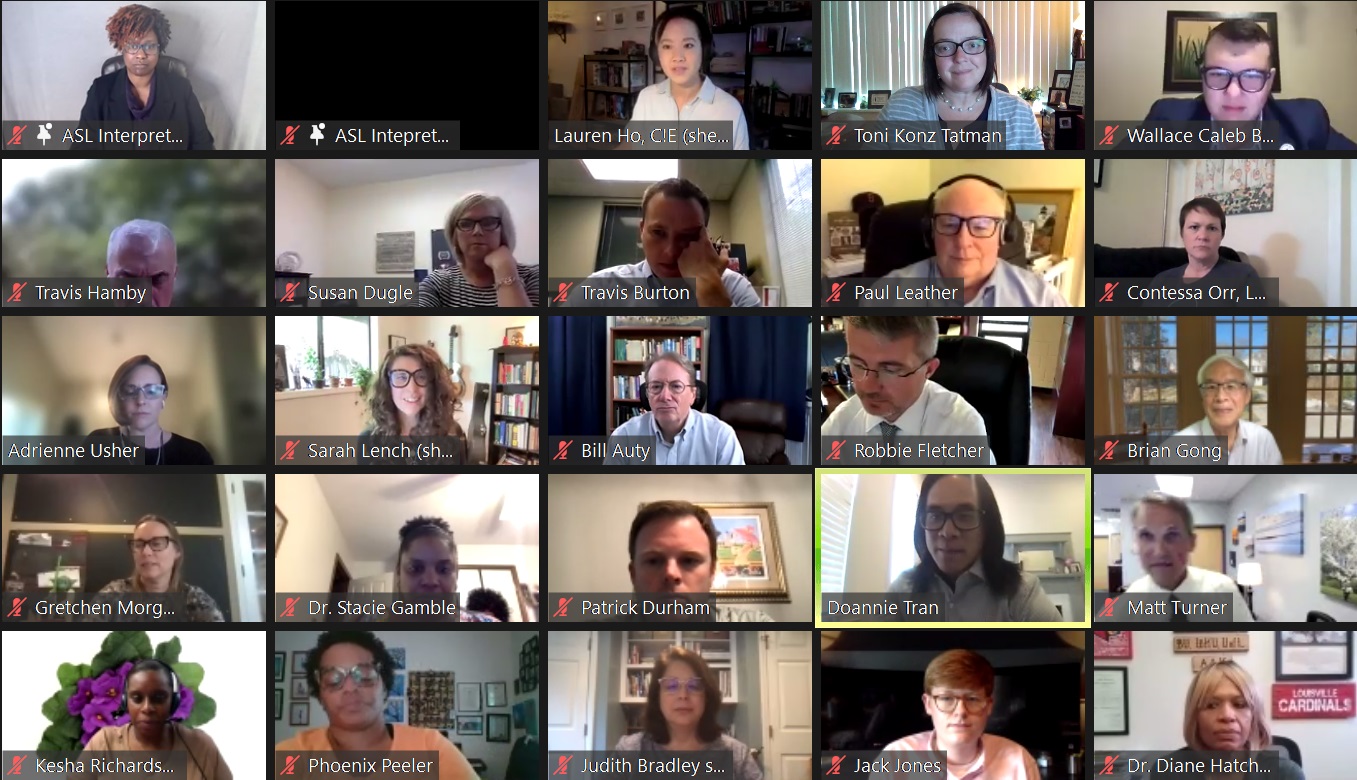 The Kentucky Coalition for Advancing Education (KCAE) had several goals for their second meeting on June 8, which included building an understanding of the dimensions of identity and community. The group first met on June 1 to kick off the coalition’s work, which will continue over the next few months.
The Kentucky Coalition for Advancing Education (KCAE) had several goals for their second meeting on June 8, which included building an understanding of the dimensions of identity and community. The group first met on June 1 to kick off the coalition’s work, which will continue over the next few months.
KCAE was formed to bring together perspectives from across the Commonwealth to create a vision for public education. The coalition will co-create that vision with communities, foster local innovations and advance policy recommendations to shape the future of education in Kentucky. In order to bring together the necessary perspectives and voices, the Kentucky Department of Education (KDE) and its partner, the Center for Innovation in Education (C!E), recognized that three distinct groups of stakeholders must be included in this crucial work: critical stakeholders, interested stakeholders, and potential stakeholders.
“We are so grateful for this group of Kentuckians coming together to help us work through all the data we collected on our KDE listening tour, and to work on an aspirational future vision for Kentucky’s schools,” said Commissioner of Education Jason E. Glass.
Melissa Hagans, a retired Fayette County Schools educator, and Adrienne Usher, assistant superintendent at Bullitt County Schools, kicked off the meeting by leading the group through a connection activity. Participants completed an “identity web,” which helped them name different characteristics, labels or backgrounds that they may use to describe themselves, or that have been placed upon them by others.
Coalition members broke into small groups to share what the most important items on their identity webs were.
Faneshia Jones, an education recovery leader at KDE, said being from a small town is something that has shaped her identity throughout her life.
Hagans also asked the group to reflect on how their identities contribute to the purpose of KCAE’s work.
“I am a second language user (English), my first language is Spanish,” said Alfonso De Torres Núñez, a teacher at Bloom Elementary (Jefferson County). “My skills in teaching a language, in anything related to culture, global competency, international studies, in combination with my professional experience both as a teacher and a state supervisor – I put it all to the service of the 15,000+ students in our Commonwealth whose first language is not English.”
Connecting schools and communities
Gretchen Morgan, managing partner at C!E, discussed with the group why it is important that schools work to understand their communities’ and students’ identities. Morgan said sometimes communities feel that the way the state views them is simplistic, and that reading and math test scores do not show the reality of what a community is really like.
Morgan asked the group to share ways schools already are encouraged to know communities or learners.
“Work-based learning helps students know the community well and helps the community know our students,” said Susan Dugle, chief academic officer at Shelby County Public Schools.
“Difficulties come from the size of classes when it comes to getting to know the identities of students,” said Chaka Cummings, a teacher at Sayre Middle School (Fayette County). “As we find ways to make things ‘smaller,’ like athletic teams and clubs, we learn more about the identities of our students.”
Morgan explained it is important for schools to know communities and learners well in order to avoid the “single story” issue, a phrase made popular by the Author Chimamanda Ngozi Adichie to describe the simplified and sometimes false perceptions we form about individuals, groups or countries.
For the remainder of the meeting, coalition members worked on creating “user profiles,” created from previously gathered empathy interviews. The user profiles will help the group get a full picture of enough stories in order to avoid the “single story” issue.
The coalition will meet next on June 15.



Leave A Comment